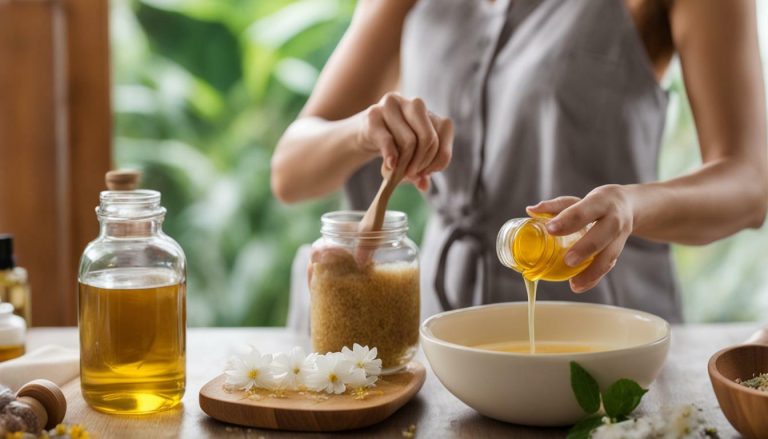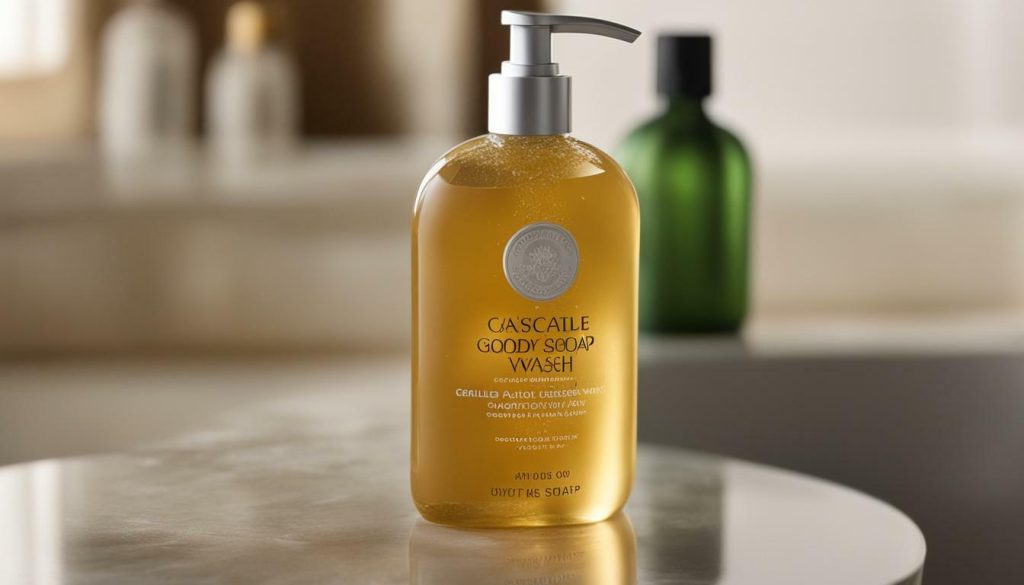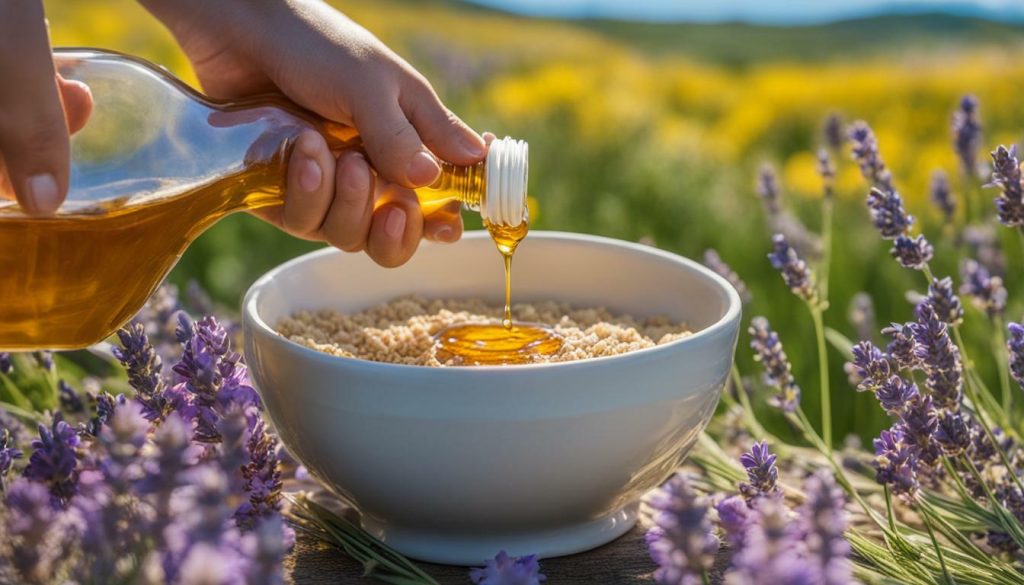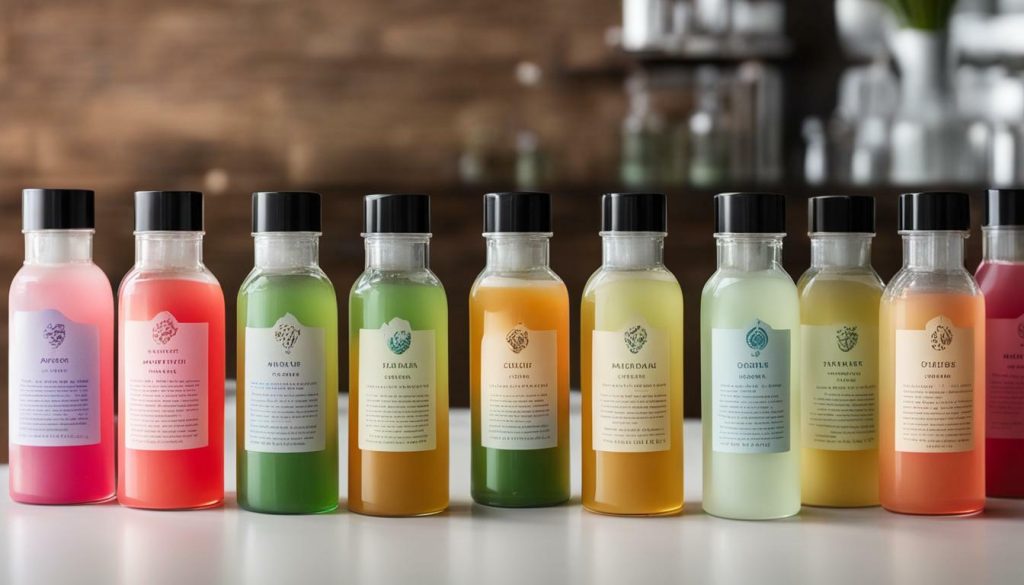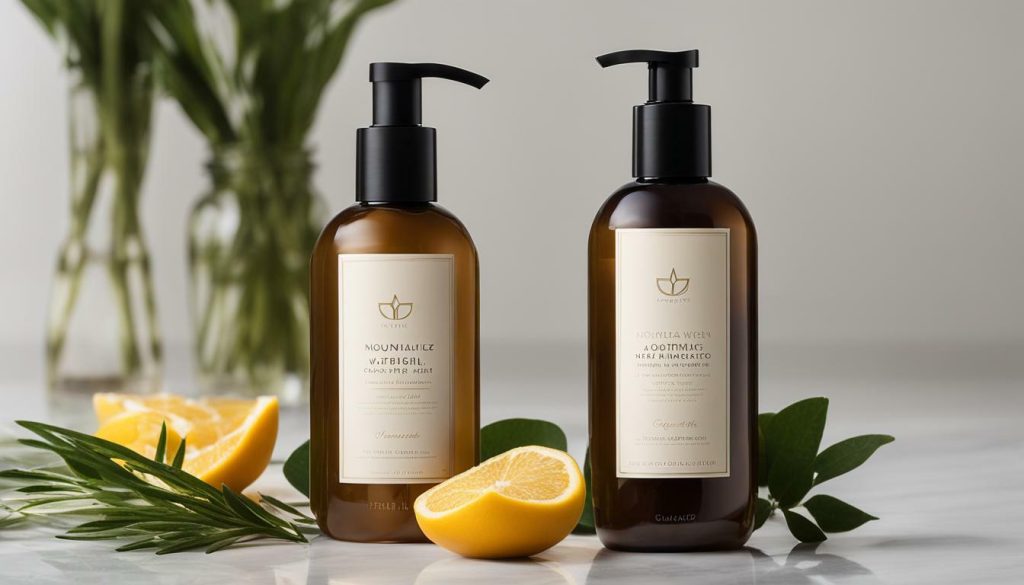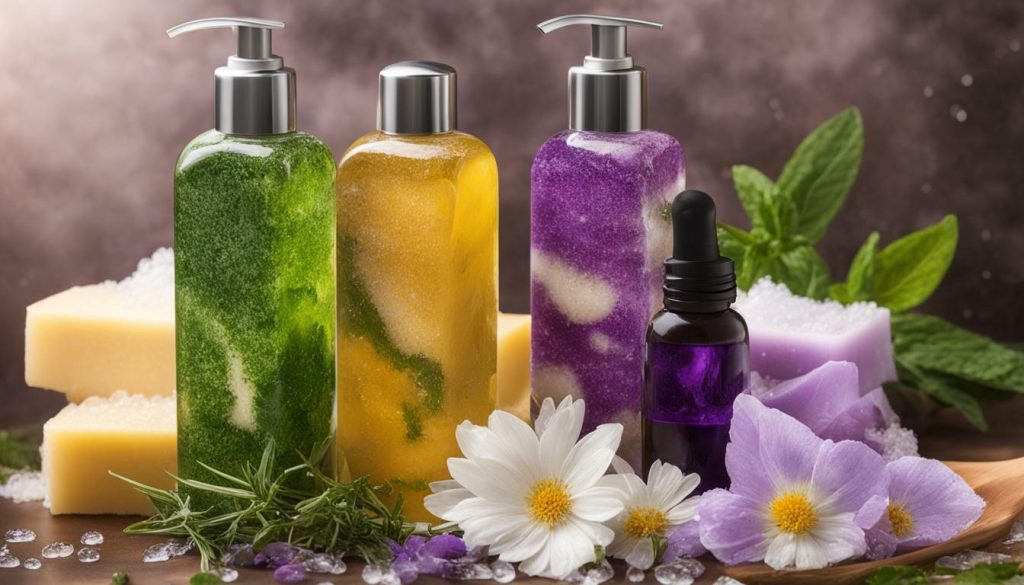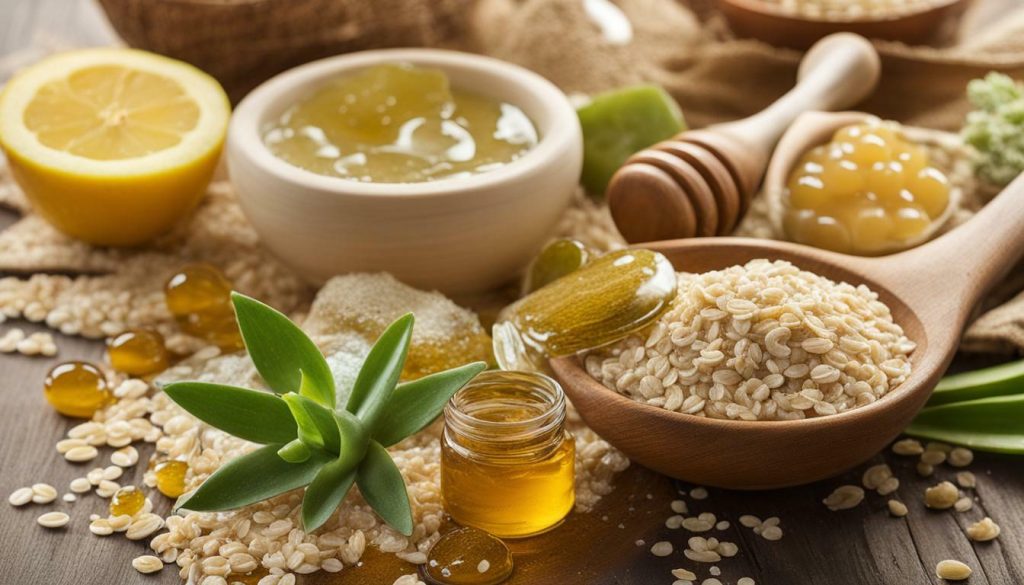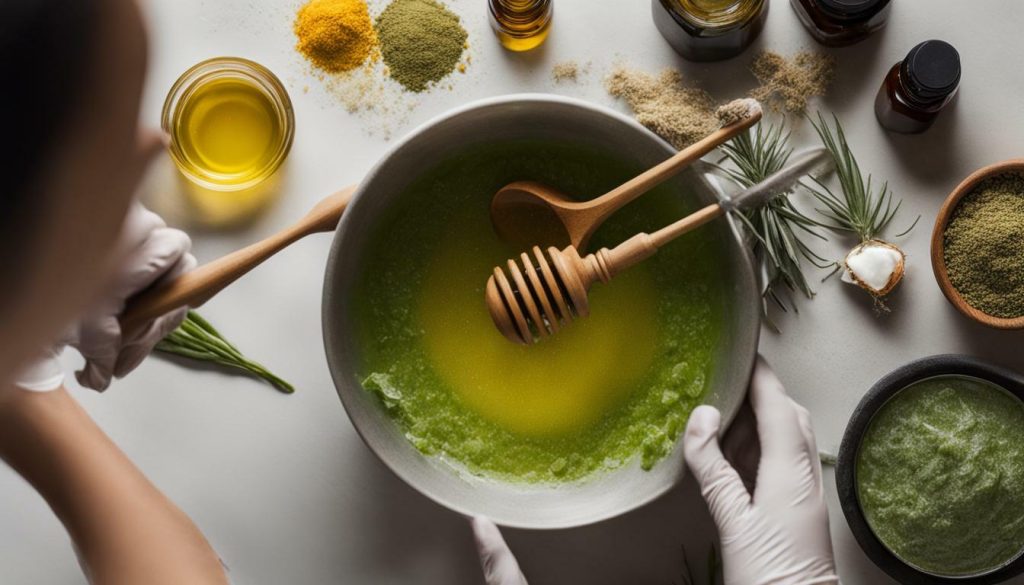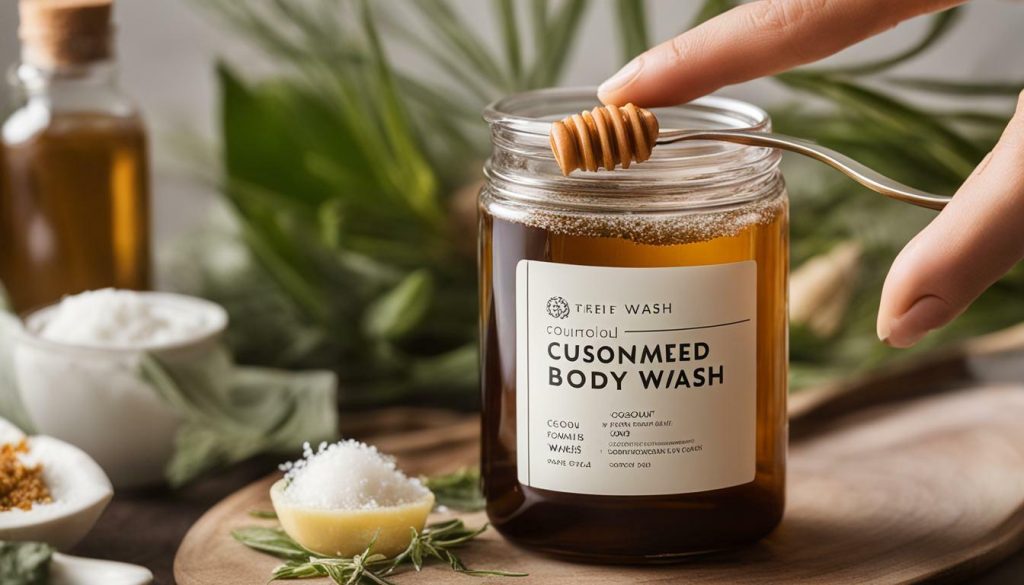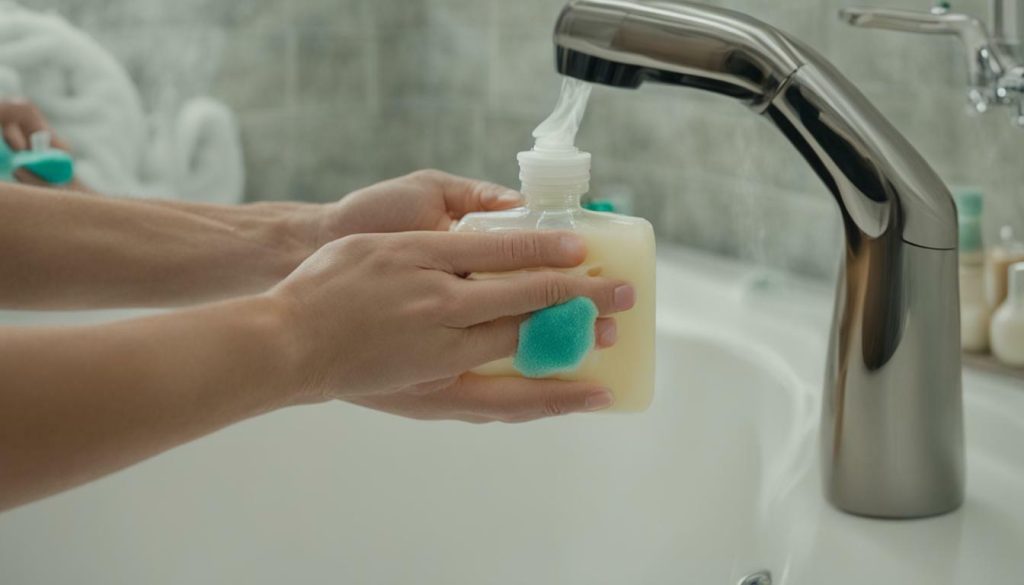Are you looking for a natural and personalized body wash but want to avoid traditional ingredients like castile soap and glycerin? You’ve come to the right place. In this article, we’ll guide you through the process of creating your own body wash without these common ingredients. Whether you have sensitive skin, allergies, or just prefer alternative ingredients, you can customize your body wash to suit your needs. Let’s get started!
- Castile soap and glycerin are common ingredients in body wash but can be easily substituted.
- Homemade body wash can be personalized to cater to your skin’s unique needs.
- Natural ingredients such as carrier oils and essential oils provide cleansing and moisturizing properties.
- Natural thickeners like xanthan gum and guar gum can help achieve the desired texture.
- Testing and proper storage are crucial to maintain the quality and longevity of your body wash.
Understanding Castile Soap and Glycerin in Body Wash
Before we dive into the process of making body wash without castile soap and glycerin, it’s essential to understand the role of these two ingredients in traditional body wash. Castile soap is a gentle, vegetable-based soap, often made from olive oil, which provides effective cleansing properties. Glycerin, on the other hand, is a humectant that helps to retain moisture and nourish the skin.
While these are commonly used ingredients in body wash, some individuals may prefer to avoid them for various reasons, such as allergies or personal preferences. Luckily, there are alternative ingredients available that can provide similar benefits without including castile soap and glycerin.
Homemade body wash is a great way to ensure that you’re using natural ingredients on your skin. When making your own body wash, you’ll need to gather a few alternative ingredients that work well as substitutes for castile soap and glycerin.
The key to a great homemade body wash is to use natural ingredients that are gentle on your skin while still providing cleansing and moisturizing benefits. Some natural ingredients that work well include:
Liquid Soap Base
The liquid soap base is the foundation of your homemade body wash. Look for a mild, unscented liquid soap base that is free from harsh chemicals and additives. Coconut oil-based liquid soaps or mild liquid castile soaps can be used as alternatives to traditional castile soap.
Carrier Oils
Carrier oils are rich in nutrients and provide nourishment to the skin. Consider adding carrier oils such as almond oil, jojoba oil, or avocado oil to your homemade body wash. These oils will help moisturize and keep your skin hydrated without the need for glycerin.
Essential Oils
Essential oils not only add a pleasant fragrance to your body wash but also offer various therapeutic benefits. Choose essential oils based on your scent preferences and desired effects. Lavender, tea tree, and citrus oils are popular choices that provide a refreshing and uplifting experience during your shower.
Natural Thickeners
If you prefer a thicker consistency for your body wash, consider using natural thickeners. Ingredients like xanthan gum, guar gum, or aloe vera gel can help achieve the desired texture without relying on glycerin. These thickeners also provide additional benefits for your skin.
By using natural ingredients in your homemade body wash, you can avoid harsh chemicals and additives found in commercial body washes. Not only is it better for your skin, but it’s also affordable and customizable. In the next section, we’ll explore the different liquid soap bases you can use for your homemade body wash.
Choosing a Liquid Soap Base
When making your own body wash without castile soap and glycerin, the liquid soap base serves as an essential component. Opt for a mild, unscented liquid soap base to avoid any harsh chemicals and additives that could harm your skin. Coconut oil-based liquid soaps or mild liquid castile soaps are great alternatives to traditional castile soap.
The type of liquid soap base you choose will determine the effectiveness and overall quality of your body wash. Ensure that the liquid soap base you select is suitable for your skin type and doesn’t interfere with any other ingredients in your body wash.
Remember, the quality of your liquid soap base is crucial in providing a gentle and nourishing cleansing experience. Choose wisely and watch your homemade body wash transform your skin-care routine.
Incorporating Carrier Oils for Moisturization
One of the essential ingredients for making homemade body wash without castile soap and glycerin is carrier oils. Carrier oils are rich in nutrients that moisturize and nourish the skin. Adding carrier oils to your body wash will help keep your skin hydrated and smooth, without the need for glycerin.
Some popular carrier oils for body wash include almond oil, jojoba oil, and avocado oil. Each of these oils has its unique properties that benefit the skin:
- Almond Oil: This oil is rich in vitamin E and fatty acids, making it an excellent moisturizer for dry and sensitive skin. It is also gentle on the skin and absorbs quickly, leaving no greasy residue.
- Jojoba Oil: Jojoba oil is similar to the natural oils produced by the skin, making it an ideal moisturizer for all skin types. It also has anti-inflammatory properties, making it an excellent choice for those with skin irritations.
- Avocado Oil: Avocado oil is rich in antioxidants like vitamin E and omega-3 fatty acids, making it an excellent moisturizer for dry and damaged skin. It also helps to improve skin elasticity and reduce the signs of aging.
Experiment with different carrier oils to find the one that best suits your skin’s needs. You can also mix different carrier oils to create a unique blend that provides maximum benefits.
Essential oils are a fantastic addition to your homemade body wash, as they not only provide a pleasant fragrance but also offer therapeutic benefits for the mind and body. You can customize your body wash by choosing essential oils based on their scent and effects.
Lavender oil is a popular choice due to its calming properties, making it an excellent choice for relaxing showers before bed. Tea tree oil has antimicrobial properties and can help combat body acne and fungal infections. Citrus oils like orange and lemon provide an energizing and uplifting experience during your morning showers.
It’s important to note that essential oils are highly concentrated and potent, so always dilute them before using them on your skin. A general rule of thumb is to add 10-20 drops of essential oil per 8 ounces of liquid soap base.
Once you’ve chosen your essential oils, simply mix them into your liquid soap base and carrier oils. Stir well to ensure the oils are fully incorporated into the mixture. Test the scent by smelling the body wash and adjust according to your preference.
A Note on Safety
Essential oils should always be used with caution, as some oils may irritate the skin or cause allergic reactions. Before using any essential oil, research its safety and possible side effects. You can also do a patch test by applying a small amount of the diluted oil to your skin and waiting 24 hours to see if any reactions occur.
Natural Thickeners for Body Wash Texture
If you prefer a thicker consistency for your body wash, you can achieve it using natural thickeners. These ingredients not only provide the desired texture but also offer additional benefits for your skin.
Xanthan gum is a popular natural thickener that is easy to use. It is derived from sugar and can help create a smooth and creamy texture for your body wash. Another option is guar gum, a natural extract from guar beans that can provide a similar effect as xanthan gum.
Aloe vera gel is also a great natural thickener that can provide added benefits to your skin. It has hydrating and soothing properties and can help reduce inflammation and irritation. Adding aloe vera gel to your body wash can give it a desirable texture and provide extra nourishment to your skin.
Experiment with different natural thickeners to find the one that works best for your body wash. Keep in mind that adding too much thickener can make your body wash too thick and difficult to use. Start with a small amount and increase gradually until you achieve your desired consistency.
Step-by-Step Guide to Making Body Wash Without Castile Soap and Glycerin
Now that you have all the necessary ingredients, let’s walk through the process of making your own body wash without castile soap and glycerin. Follow these easy steps to create a personalized body wash that suits your skin’s needs.
Ingredients:
- 1 cup mild, unscented liquid soap base
- 1/4 cup carrier oil (such as almond oil, jojoba oil, or avocado oil)
- 10-15 drops essential oil(s) of your choice
- 1 tablespoon natural thickener (such as xanthan gum, guar gum, or aloe vera gel)
- 1 glass bottle or jar with a lid
Instructions:
- Combine the liquid soap base and carrier oil in a mixing bowl.
- Add 10-15 drops of your preferred essential oil(s), depending on your scent preference and desired benefits. Stir gently to blend.
- Add a tablespoon of natural thickener gradually while stirring constantly. Continue adding until the desired thickness is achieved.
- Once the mixture has reached your desired consistency, pour it into a glass bottle or jar with a lid. Store in a cool, dry place.
Congratulations! You now have your homemade body wash without castile soap and glycerin, ready to enjoy during your daily shower routine.
Now that you’ve learned how to make your own body wash without castile soap and glycerin, it’s time to personalize it based on your preferences and needs. Here are some tips and ideas to help you customize your body wash:
- Add exfoliating ingredients: If you want to exfoliate your skin while cleansing, consider adding ingredients such as sugar, salt, or ground coffee to your body wash. These natural exfoliants will gently remove dead skin cells and leave your skin feeling smooth and refreshed.
- Adjust the scent: Essential oils are a great way to add a pleasant fragrance to your body wash, but you can also experiment with combining different scents to create a unique aroma. For example, mix lavender and peppermint essential oils for a calming and invigorating scent.
- Incorporate skin-soothing additives: If you have sensitive or easily irritated skin, consider adding ingredients such as colloidal oatmeal, honey, or chamomile tea to your body wash. These additives have soothing and anti-inflammatory properties that can help calm and nourish your skin.
By customizing your body wash, you can create a product that caters to your specific needs and preferences. Have fun experimenting with different ingredients and scents to find your perfect formula.
Testing and Storing Your Homemade Body Wash
Before incorporating your homemade body wash into your daily routine, it’s important to conduct a patch test to ensure it suits your skin type. Apply a small amount of the body wash on a small patch of skin, such as the inside of your wrist, and wait 24 hours to see if there is any allergic reaction or skin irritation. If there is no adverse reaction, you can safely use your homemade body wash.
To maintain the quality and longevity of your homemade body wash, store it in a clean, dry container with an airtight lid. Exposure to air and moisture can cause bacteria growth, spoilage, or a change in consistency or scent. Keep your body wash away from direct sunlight and extreme temperatures. If you notice any changes in color, smell, or texture, discard the body wash and make a fresh batch.
Benefits of Making Your Own Body Wash
Switching to a homemade body wash made without castile soap and glycerin can have numerous benefits for your skin and overall well-being. By using natural and organic ingredients, you have greater control over what goes into your body wash, ensuring that it is free from harsh chemicals and irritants that can damage or dry out your skin.
One of the main advantages of homemade body wash is that it can be customized to your skin’s unique needs. By incorporating carrier oils and essential oils, you can tailor the formulation to target specific skin concerns, such as dryness, acne, or inflammation. This level of personalization ensures that you are treating your skin with the care and attention it deserves.
In addition to being more skin-friendly, homemade body washes can also be more economical and eco-friendly. By making your own body wash, you save money and reduce waste associated with single-use packaging. Plus, you can reuse existing containers or opt for refillable options to minimize your impact on the environment.
Finally, using a homemade body wash promotes a more natural and holistic approach to skincare. By embracing natural ingredients, you are supporting a healthier and more sustainable approach to self-care. This can have positive impacts on both your physical and mental health, resulting in a happier, more confident you.
Congratulations on learning how to make your own body wash without castile soap and glycerin. By following our step-by-step guide and utilizing alternative ingredients, you can now enjoy a body wash that is personalized, natural, and affordable, all while aligning with your skincare preferences.
Making your own body wash offers many benefits, including knowing all the ingredients used, avoiding harsh chemicals, and customizing the formulation to suit your unique skin needs. Plus, it’s a fun and creative way to take control of your skincare routine and indulge in the benefits of natural, homemade body wash.
Remember to conduct a patch test before incorporating your body wash into your daily routine and follow our recommendations for proper storage. With these tips and tricks, you can ensure that your homemade body wash remains high-quality and beneficial for your skin.
Thank you for following along with us as we explored how to make body wash without castile soap and glycerin, and we hope that you enjoy your newfound knowledge and beautiful, homemade body wash.

Hey there! I’m Dr. Mary Noland, your trusted authority in dermatology. My 17-year rollercoaster ride in skin science has been nothing short of a masterclass. Whether you’re a newbie or a familiar face, I’m here with open arms and Medicare-friendly services, dedicated to creating your perfect skin haven.
But hold up! There’s more to me. When I’m not elbow-deep in dermatology, I’m lighting up derma blogs with insights that peel back the layers of skin health. Also, as the proud captain of ‘buybodywash.com‘, I provide all the body care goodness you need!
Trust me; I’m more than just a white coat. I’m here to lend an ear, share a laugh, and bring calm with a reassuring voice that’s comforted countless patients.
So, meet Dr. Mary Noland – your dermatologist and your guide and friend on the path to radiant skin. I am excited to meet you soon!

